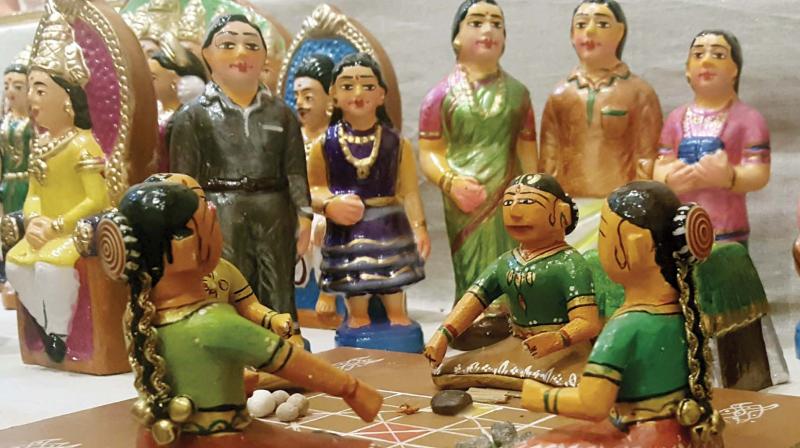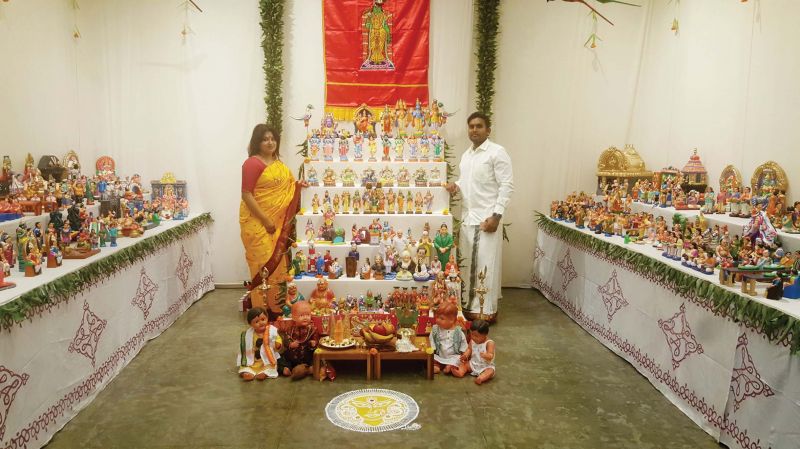Doll'ing up for dasara

“Don't let them break, don't let them break," Eshwar and Rohini Naidu waited, with trepidation, as their beloved golus were packed into a truck, all set for their journey from Thiruvananthapuram to Bengaluru. It was a nerve-wracking experience and a milestone in the young couple's lives: This is the first time their extensive golu collections has left the confines of their Kerala home, where visitors usually come to take a look.
The atmosphere at 1 Shanthi Road resembles a temple, so much so that one asks, rather stupidly, if shoes need to be left at the door. This sends Rohini Naidu, who sits in a corner, surveying her dolls, into peals of laughter. "No no, come on in." Then again, Rohini and her husband, Eshwar, are used to fielding silly questions of this nature - their passion, the golus - are usually associated with the Tamil Brahmin community. The gallery is ablaze with colours, the Hindu pantheon lined up along its walls. A closer look reveals a multitude of stories: The busts of freedom fighters, for example, occupy pride of place. Another set shows a group of schoolchildren, studying Tamil in school. Ceremonial musicians have their place - and the myths, too. "It is about stories," Rohini agrees. The nuances of human interaction all find room in Hindu philosophy, its myths and its art, much of which is brushed under the carpet in the name of political diatribe.
"Nearly every doll you see here is custom-made," says Rohini, at the start. This is what sets their collection apart, however. Instead of the usual store-bought varieties, Eshwar and Rohini look for the craftsmen themselves. "I don't even like to use the word 'buy'," she says, wrinkling her nose in distaste. "Our transactions are about human interactions and relationships."

The stories run like a common thread through the collection, where myths from the Ramayana find common ground with Rohini and Eshwar's love for their dog. That's the first golu set she approaches: the Vidyarambham with a twist. This is a ceremony of initiation into the arts or knowledge of any kind, usually done on Vijayadashami. This is a Vidyarambham with a twist, however, for it's dedicated to their dog's first birthday! "We don't have kids, just a dog," she laughs. When their dog died in an accident last year, their golu display had a doll made in his dedication, which they placed in the centre, with the deities.
Through years of collecting golu have given rise to new traditions as Eshwar and Rohini look for new stories, new points of meaning in their lives. Which one wouldn't guess, given their very traditional attire - then again, if there's one thing Rohini accomplishes during the conversation, it is her ability to destroy stereotypes faster than they materialise. She's used to it. There was a time in her life when Rohini wanted nothing more than to shut herself off from the world. She simply didn't want to deal with the different notions of feminism that came her way. The fact that she loved to crochet made it even worse. "I'm not a golu maami," she says, half-amused.
A student of the arts with a fascination for the crafts and their technical processes, Rohini's love for the brighly-coloured golu isn't too much of a leap. The story of their beginnings is an eclectic one, for neither came from a family that followed the golu tradition. Eshwar, an aircraft engineer who collects vintage cars, remembers asking his mother, as a child, if she would set up a golu display. When she refused, his love for the dolls was put on hold. Until he turned 24 and met Rohini. It was only after they married that they decided to make something of their passion. "There are a lot of things I can't rationally explain," Rohini ventures, looking slightly apologetic. "Yesterday, at the opening, my audience wanted completely logical answers, which I found I couldn't give. For instance, we have no Krishna golus in our collection, although this wasn't planned. Maybe Krishna doesn't want to come to us. I don't know how else to explain it, really."
Then there are the doll makers themselves. The golu tradition is an old one, usually followed in joint families where every member had a role to play. "You would have one person who only did the eyes and another working solely on the lips," Rohini explains.
Today, as nuclear families seem to be the preferred option, these traditions are dying. Rohini gestures towards an elaborate Ramayana scene to make her point. The golu set came from a dollmaker's home in Trichi, where the tradition was four generations old. "That's four generations of only Ramayana stories," she says. The old couple's grown-up children have moved to cities and live the corporate life, often asking their parents to move closer to them. This year, they decided, would be their last, making golus. "The last five sets are here with us," says Eshwar.
"Are the dollmakers Brahmins?" Again, Rohini's response is solely for visitors, never once in their decade-long association has 'caste' ever come up with a dollmaker. "There was no need," she says. "We work together, we're creating something. How does caste matter?" It's unfortunate, no doubt, that Rohini and Eshwar need to arm themselves with explanations but they understand the volatility of the situation. "It's a very simplistic view of Hinduism," Rohini says. "There's so much to our customs and traditions but you're judged now, for even talking about them. India is so wonderfully diverse and at this rate, we're heading towards homogenity, which is most unfortunate."
Also part of the display are four vintage dolls, which Eshwar explains go back to the 1930s and 40s. These dolls, blonde-haired and pale-cheeked, often found their way into the homes of wealthy Chettiar families. As it happens, they're made in Japan. "They were made for export but the Chettiars, who are wealthy and known for their lavish lifestyles, managed to procure these during their travels. They would bring them home for their children."
She even goes so far as to state that the dolls aren't religious. "It's about livelihoods and artistic traditions," she argues. "I'm never happier than when a golu maker tells me that my order will allow him to send his daughter to school. And there's so much to the process - the traditions, the stories and the colours! Oh, the colours!"
What: Dasara Doll Festival
When: Till October 19
Where: 1 Shanthiroad Studio, 1 Shanthi Road, Shanthinagar
B02

